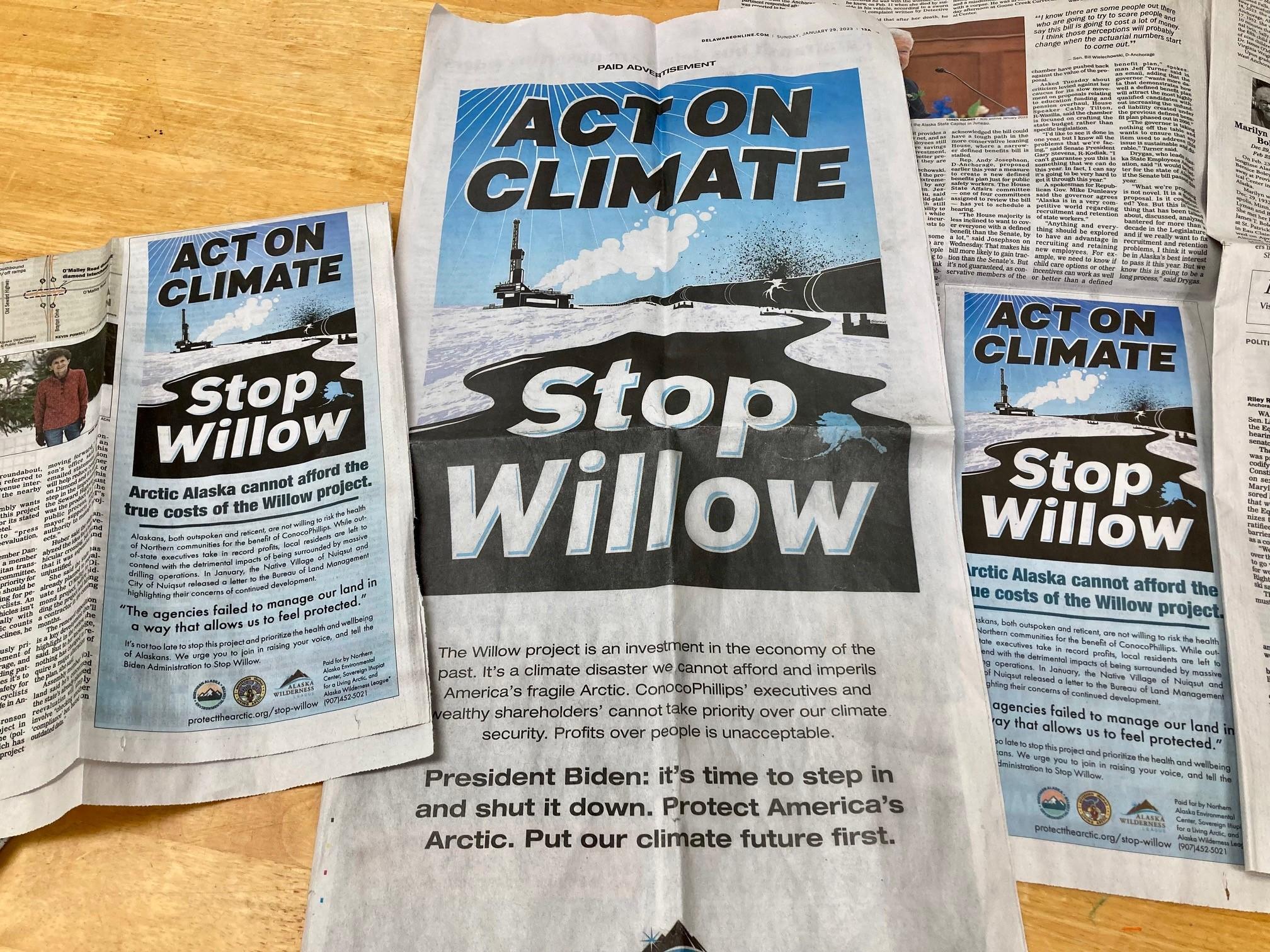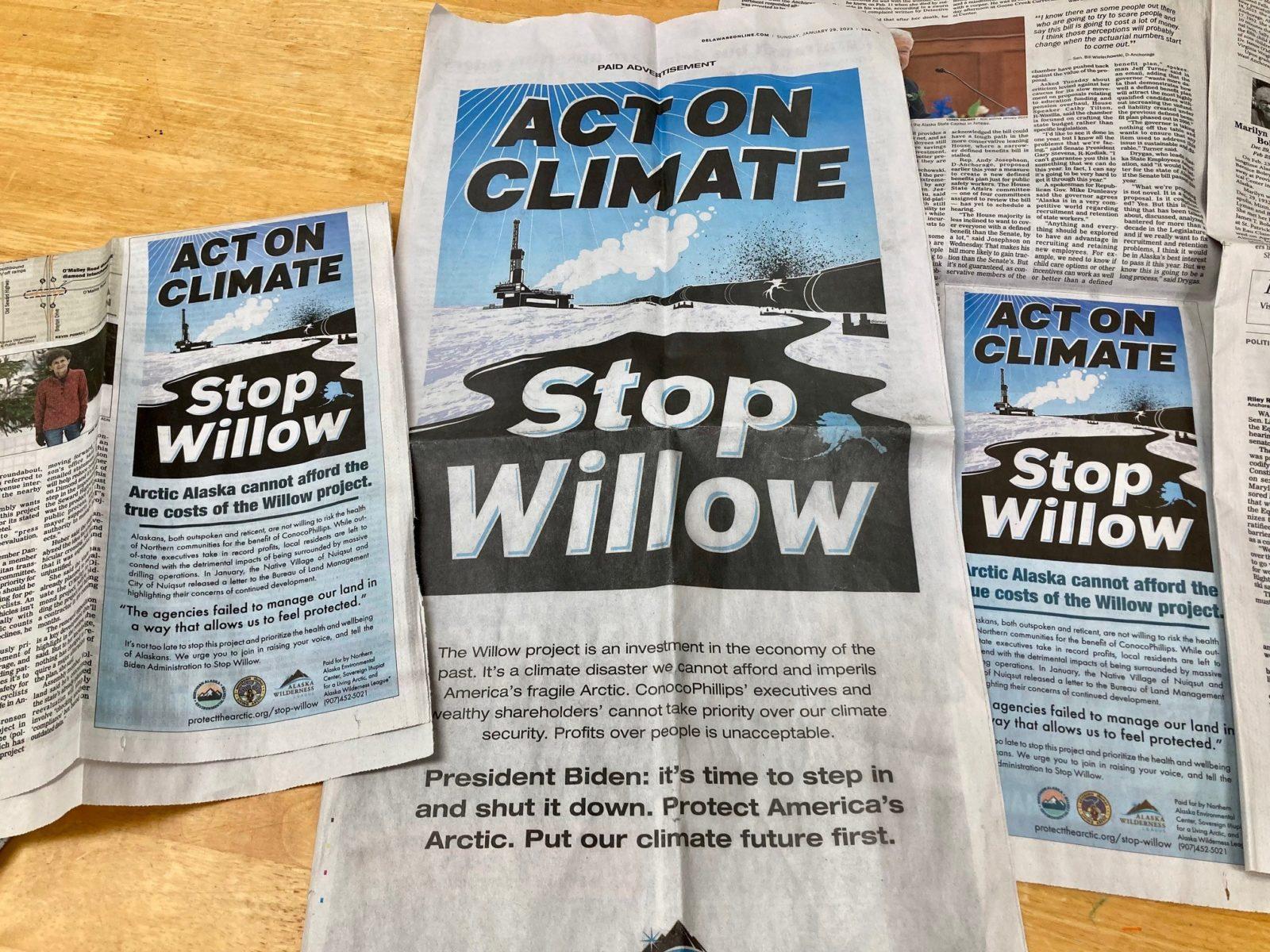
We sued the Biden administration’s approval of the Willow project. Let’s pause now to share these words from SILA
By Dawnell Smith
The Biden administration released its final decision on the ConocoPhillips Willow project at 5 am Alaska time on Monday, March 13.
ConocoPhillips started building an ice road that day—with U.S. Bureau of Land Management permits in hand—and intends to start blasting at a gravel mine on Sunday, March 19.
We filed a lawsuit on March 14, charging the Interior Department and multiple agencies with illegally approving Willow. (You can read more about Sovereign Iñupiat for a Living Arctic vs. Bureau of Land Mgmt. here.) And then we filed a motion on March 16 seeking preliminary injunction to stop ConocoPhillips’ harmful construction plan.

In between the approval and our litigation, Alaskans and people around the country and world who oppose Willow because of all the ways it harms land and water, local people, and our climate future expressed sorrow over Biden’s decision. They also shared renewed strength.
We want to share the words of Sovereign Iñupiat for a Living Arctic, whose staff were bombarded with requests for interviews when the Willow project was approved, and who also felt the approval not just as part of a news cycle, but as a time of mourning and recognition of the deep hurt industrial projects can do to people, animals, the land, and the future.
Wealth is not what is in bank accounts
SILA called the approval of Willow a great disappointment and noted the “years of grassroots, Iñupiaq-led opposition, especially from the community most impacted, Nuiqsut. With the support of millions worldwide, Willow went from predominantly an Alaska-based issue to a global concern—within weeks, millions of voices stood up against the oil and gas industry to protect the Arctic.”
SILA shared in its statement that the U.S. Bureau of Land Management acknowledged in its environmental review that if approved and built, Willow will have a disproportionate impact on Nuiqsut’s health, subsistence, and sociocultural systems.
The approval of Willow is a slap in the face for environmental justice, the message says before continuing:
“We condemn the continued prioritization of profit over climate and people. While this project may have been approved, the effort to divest from fossil fuels and invest in renewable energy continues. We mourn the implications of worsening climate change within the Arctic and worldwide. We mourn for our animal relatives who cannot speak or ask for protection, for the water that will forever be polluted, and especially for those who have been taken from us by the cancer caused by these extractive industries.
SILA
The only reasonable solution to climate change is the divestment from all fossil fuels and a Just Transition into renewable energy. The fossil fuel industry is obsolete and will come to an end soon, whether it be from climate catastrophe or the rational and wise decisions of our leaders. Yes, it will be hard to transition from fossil fuels. Yes, it will be expensive. But there is no greater price to pay than the loss of biodiversity, coastlines, and lives.
Wealth is not what is in bank accounts, it is what we are able to provide for the environment around us and one another. And in this way, we are not setting up for our future generations to be wealthy. Ensuring that communities like our own are able to not only survive but thrive through this transition into a sustainable future is vital to environmental justice. This is a shift from a destructive economy to a regenerative economy. A Just Transition is setting the intentions to be a good ancestor and good relative to each other and the land and water. It means creating new relationships, deconstructing harmful processes of power, and providing for communities most dependent on extractive industries. It means understanding that there may not be a perfect answer that’ll be the forever solution and that we must address our ever-changing needs.
While this project may have been approved, the effort to divest from fossil fuels and invest in renewable energy continues. We will not give up protecting the Arctic today, tomorrow, or ever.
Who benefits from compromises and tradeoffs?
When we hear people talk about the political and economic compromises and tradeoffs made between corporate and government institutions of power, we should stop telling ourselves this is just the way things are and start asking ourselves, who benefits from compromising and trading away the health and future of other people and communities and living things?
Who holds power by asserting a zero-sum worldview and narrative that asserts and then justifies making some people pay the price for other people’s wealth, power, greed, and comfort?
When people in power talk about compromises and trade offs, they’re talking about getting what they want under the guise of give and take, but give and take isn’t regenerative, it’s transactional.
What we should fight for is reciprocity, what SILA describes as “setting the intentions to be a good ancestor and good relative to each other and the land and water… creating new relationships, deconstructing harmful processes of power, and providing for communities most dependent on extractive industries.”


